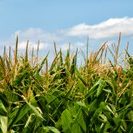
From AgWeb By Tyne Morgan
USDA’s 2021 Ag Outlook Forum kicked off Thursday morning with a peek at the possible acreage mix for 2021. During the Forum, USDA’s new chief economist, Seth Meyer, pointed out that the acreage picture largely hinges on weather, as it normally does.
Meyer told Outlook attendees the projection is based on the assumption of normal planting weather. He says if weather cooperates, U.S. farmers could see an increase in total planted acres in 2021, with a record combined corn and soybean planted acres this year.
The USDA chief economist’s first look at acreage shows 2021 planted acres as follows:
- 92 million acres of corn
- 90 million acres of soybean
- 12 million acres of cotton
While the corn and cotton acreage projection from USDA is in line with what farmers planted last year, the soybean acreage number is a bump from the 83 million acres planted in 2020.
American Farm Bureau Federation chief economist, John Newton, said on U.S. Farm Report last weekend that he expected to see an increase in total planted acres this year, mainly due to areas that saw significant prevent plant the past couple years were finally starting to dry out.
“I think one area to look at is previous prevent plant,” says Newton. “In 2019, we had nearly 20 million acres classified as prevent plant. Last year, we had 10 million acres that qualified for prevent plant. You could see some of those 10 million acres may come back online in corn and soybeans.”
Chip Nellinger, Blue Reef Agri-Marketing, agrees with Meyer about the weather. Nellinger thinks if the weather cooperates, farmers will plant more corn.
USDA will release its prospective plantings report at the end of March, which will will reveal farmer survey results.
“On the case of corn, it’s going to boil down to Mother Nature, as it always does,” he says. “If we get a good early, open planting window, I think it favors corn. It always does historically. But it’s going to be interesting, because we’ve got such tight stocks that we need to increase supply and have good yields and good crops. But how that acreage mix is going to pan out is anyone’s guess at this point.”
Nellinger pointed out it’s more than just corn and soybeans fighting for acres. He says as cotton prices climb to the 90-cent range, cotton could continue to be an attractive option to some farmers in the South this year.
“Three months ago, a lot of people in the Mid-South were saying, ‘Hey, I’m going to plant more beans and less cotton.’ But the cotton market heard those whispers and has woken up here recently, which shot cotton straight through the roof. So, there’s a lot of competition here amongst a lot of different crop mixes,” Nellinger says.
While USDA’s farmer survey based projections won’t be released until the end of March in the 2021 Prospective Plantings Report, USDA did give an updated projection on prices during the Ag Outlook Forum this week.
